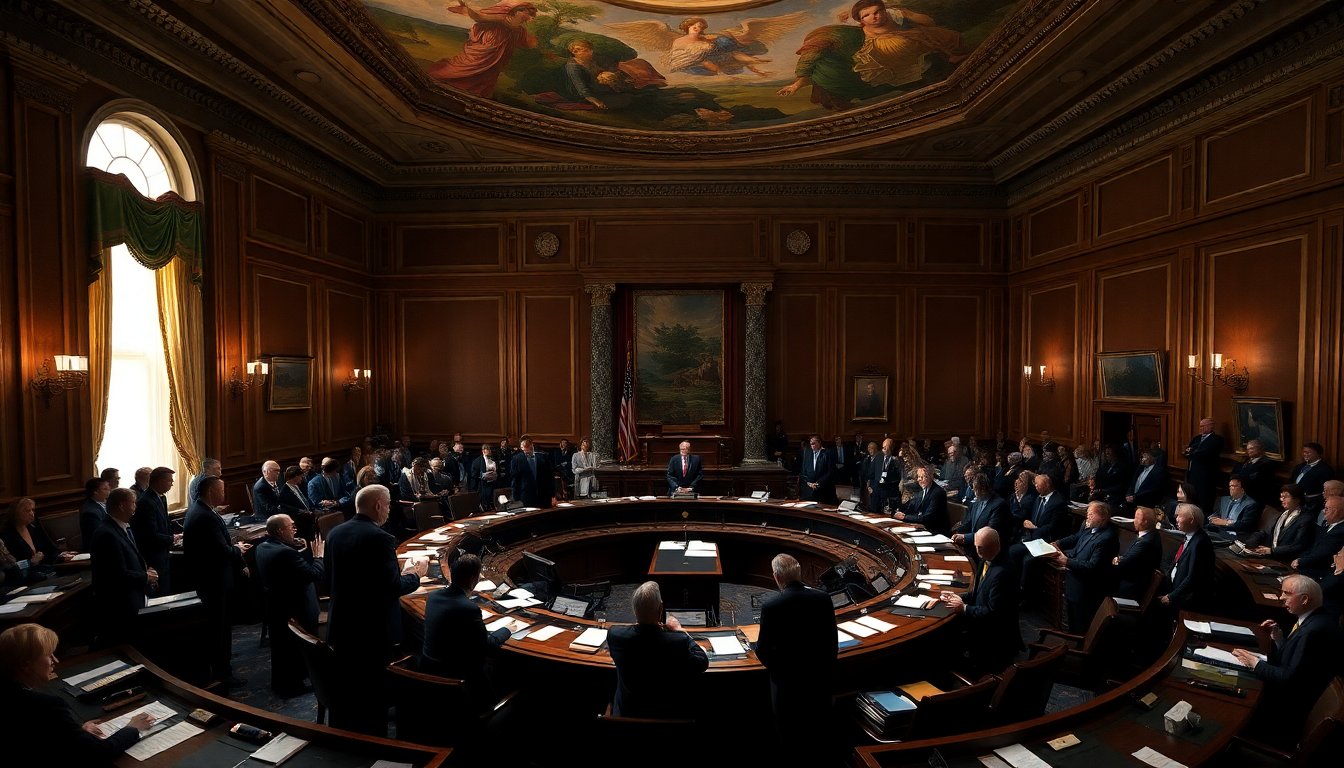Table of Contents
In a dramatic turn of events, President Donald Trump has made an appeal to Senate Republicans, urging them to consider abolishing the filibuster. This call arises as the United States faces a federal government shutdown that has persisted for more than a month. By dismantling this procedural obstacle, Trump believes Republicans could swiftly pass legislation to reopen the government.
The filibuster is a traditional Senate tactic that allows a minority of senators to prolong debate on legislation, effectively preventing a vote unless a supermajority of 60 votes is achieved. With Republicans holding a 53-47 majority in the Senate, Trump sees this as a strategic opportunity to advance their agenda.
The call for change: Trump’s strategy
On Thursday, Trump expressed his frustrations with the ongoing deadlock via his Truth Social platform. He accused the Democratic Party of being “crazed lunatics,” asserting that it is time for Republicans to play their “TRUMP CARD” and adopt the Nuclear Option. Trump emphasized, “Get rid of the filibuster, and get rid of it, NOW!”
This statement underscores his belief that the current shutdown is detrimental to the nation. Trump remarked, “If we did what we should be doing [ending the filibuster], it would IMMEDIATELY end this ridiculous, country-destroying ‘shutdown.’” His call to action aims to galvanize Republican lawmakers into decisive action.
Understanding the implications of the filibuster
The filibuster has been a cornerstone of Senate procedure for decades, intended to encourage extended debate and prevent hasty decision-making. However, it has also been criticized for creating gridlock, particularly in times of political division. Currently, the inability to secure sufficient votes has stalled critical funding measures, leaving federal employees working without pay and causing economic uncertainty.
During this shutdown, essential federal employees, including air traffic controllers, continue their jobs without compensation, raising concerns over their financial wellbeing. The Congressional Budget Office has projected that the economic toll of the shutdown could range from $7 billion to $14 billion, highlighting the urgent need for a resolution.
Trump’s recent reflections and the political landscape
Trump’s recent trip to Asia, which included visits to Qatar, Malaysia, Japan, and South Korea, has seemingly influenced his perspective on the filibuster. He noted that discussions during his travels prompted him to reflect on how Democrats managed to bring the government to a standstill. “The one question that kept coming up was how did the Democrats shut down the United States of America, and why did the powerful Republicans allow them to do it?” he pondered.
This contemplation led him to advocate for a more aggressive approach from his party. Trump asserted that Democrats would not hesitate to eliminate the filibuster if they regained power, stating that they would “exercise their rights” to do so immediately upon taking office.
Historical context and potential consequences
The debate over the filibuster is not new; it has often been a contentious issue in political discourse. Previous attempts by Democrats to abolish the filibuster were thwarted by moderate senators, such as Joe Manchin and Kyrsten Sinema, during the Biden administration. Trump pointed out that despite their efforts, the Democratic Party could not overcome this procedural hurdle.
Now, he argues that the time has come for Republicans to take bold action. “This was a concept from years ago of then President Barack Obama and former Majority Leader Harry Reid to take advantage of the Republicans. Now I want to do it in order to take advantage of the Democrats,” Trump declared, framing his argument as a necessary response to the current political climate.
The filibuster is a traditional Senate tactic that allows a minority of senators to prolong debate on legislation, effectively preventing a vote unless a supermajority of 60 votes is achieved. With Republicans holding a 53-47 majority in the Senate, Trump sees this as a strategic opportunity to advance their agenda.0
The filibuster is a traditional Senate tactic that allows a minority of senators to prolong debate on legislation, effectively preventing a vote unless a supermajority of 60 votes is achieved. With Republicans holding a 53-47 majority in the Senate, Trump sees this as a strategic opportunity to advance their agenda.1


